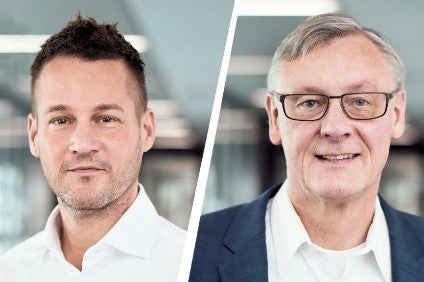
Daimler Truck has established Daimler Truck Fuel Cell, an organisational and legal framework created to bring together all group fuel cell activities.
Andreas Gorbach and Christian Mohrdieck were named managing directors of the new company.

Discover B2B Marketing That Performs
Combine business intelligence and editorial excellence to reach engaged professionals across 36 leading media platforms.
They both have extensive experience with conventional and alternative drive systems, especially fuel cell systems. Gorbach has already held a senior management position with overall responsibility for all fuel cell matters at Daimler Truck since the beginning of May this year.
This will continue in his new additional position as CEO of Daimler Truck Fuel Cell.
Christian Mohrdieck has been in charge of fuel cell development at the Daimler group since 2003 and is managing director of the current fuel cell development unit Mercedes-Benz Fuel Cell which will be allocated to the new subsidiary.
Daimler Truck concluded a preliminary, non-binding agreement with Volvo Group in April this year to establish a new joint venture for the development, production and commercialisation of fuel cell systems for heavy duty commercial vehicles and other applications such as stationary use.
Daimler Truck Fuel Cell later will transition into this planned joint venture and Volvo Group will acquire 50% of the company.
The two global, multi brand truck makers plan to start series production of heavy duty fuel cell commercial vehicles for demanding and heavy long distance haulage in the second half of the decade.
“The fuel cell is a crucial CO2 neutral solution for trucks in heavy long distance transport,” said Daimler Truck chairman Martin Daum in a statement.
“We and our future joint venture partner, Volvo Group, are convinced of this. We are determined to jointly tackle the development and series production of fuel cells and are now taking major steps with all the necessary preparations for the planned joint venture.
“The establishment of Daimler Truck Fuel Cell is a very special milestone for our company because our new subsidiary is to be the immediate predecessor organisation of the joint venture.
“In it, we will now bring together the great expertise and enormous wealth of experience from several decades of development work on fuel cells at Daimler and combine it with the right know-how in connection with trucks.”
He added Gorbach and Mohrdieck were “characterised both by profound expertise in the field of conventional and alternative drive systems and fuel cells, and by the right pioneering spirit to successfully build up the new entity and transfer it to the planned joint venture”.
Gorbach joined Daimler Trucks & Buses in 2005 and most recently was head of product management for global engines and axles at Daimler Trucks.
Mohrdieck began his career in 1989 in research at Daimler-Benz in Frankfurt.
In 2008 he became head of the fuel cell and battery drive development department.
Cooperation is also planned between Daimler Truck and Rolls-Royce for stationary fuel cell systems.
Rolls-Royce’s Power Systems division plans to use the fuel cell systems from the planned joint venture between Daimler Truck and Volvo for the MTU emergency power generators it develops and sells for data centres.
A comprehensive cooperation agreement should be signed by the end of the year.






